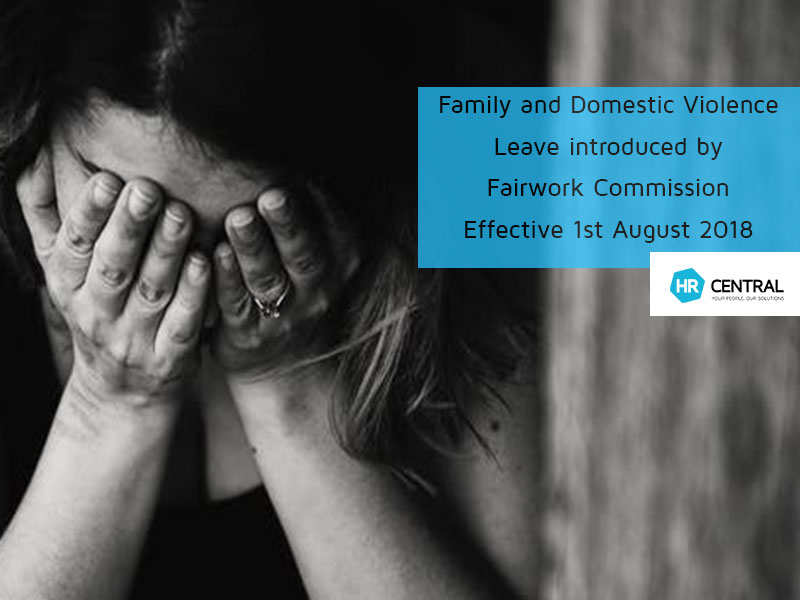All industry and occupation awards are now being updated by the Fair Work Commission to include a new clause allowing employees to take five days of unpaid family and domestic violence leave.
Who is covered?
The new entitlement applies to all employees covered by an industry or occupation award. This includes part time and casual employees.
Who is not covered?
Enterprise awards and State reference public sector awards won’t include this clause, however these employees may be entitled to other payments or leave under their award or have access to entitlements under a Workplace policy.
Employees covered by registered agreements or enterprise agreements will not be entitled to the new family and domestic violence leave in the awards however their agreement may also include entitlements to other payments or leave.
Those employees not covered by an award or an agreement will not be entitled to the leave under the award.
How is family and domestic violence leave defined?
Family and domestic violence means violent, threatening or other abusive behaviour by an employee’s family member that:
• seeks to coerce or control the employee
• causes them harm or fear
The term ‘family member’ is defined to include the employee’s spouse or former spouse, defacto partner or former de facto partner, child, parent, grandparent, grandchild or sibling, an employee’s current or former spouse or de facto partner’s child, parent, grandparent, grandchild or sibling as well as a person related to the employee according to Aboriginal or Torres Strait Islander kinship rules
From when does the new entitlement apply?
Employees covered by an award containing the new clause are entitled to five days of unpaid family and domestic violence leave each year of their employment from the first full pay period on or after 1 August 2018.The entitlement commences from the day the employee starts work, and doesn’t need to be built up. The five days renews each twelve months but does not accumulate if it is not used.
In what circumstances would family and domestic violence leave be used?
An employee can take family and domestic violence leave if they need to deal with the impact of family and domestic violence and it’s impractical to do so outside their ordinary hours of work. The leave can be taken as single or multiple days or the employer and employee can negotiate less than one day or more than five days.
The leave could be used for example:
– to attend court hearings
– to make arrangements for the safety of the employee or their family member (including relocating)
– to access police services
What notice and evidence does an employee need to give to take family and domestic violence leave?
If an employee takes family and domestic violence leave they have to let the employer know as soon as possible, and tell the employer how long they think the leave will last.
An employer is entitled to ask for evidence that the employee took the leave to deal with family and domestic violence. Employers are entitled to ask employees for evidence even if it is for one day or less off. If the employee doesn’t provide the requested evidence they may not get the leave.
The evidence has to convince a reasonable person that the employee took leave to deal with family and domestic violence. Some examples of the kinds of evidence which could be provided include:
• documents issued by the police
• court documentation
• documentation from a family violence support service
• a statutory declaration
What are the employer’s obligations with respect to confidentiality?
Employers should be aware that the information regarding an employee’s family or domestic violence situation is sensitive, and if mishandled it could have adverse effects for the employee.
Employers must take reasonable practicable steps to keep the employee’s information confidential, including information about the employee giving notice that they are going to take leave and any evidence they provide. Employers are not prevented from disclosing information:
• if required to do so by law
• if the disclosure is necessary to protect the life, health or safety of the employee or another person.
Confidential information, counselling and support for people impacted by domestic family violence is available at the 1800 RESPECT website, the national sexual assault, domestic and family violence counselling service, if you would like to pass this on to your staff/team.
Next steps for employers:
• Establish whether your employees are entitled to the leave under their existing award
• Amend any workplace policies to incorporate the new entitlements
If you have any further queries about the new family and domestic violence leave please contact HR Central on 1300 717 721 or leave your details

